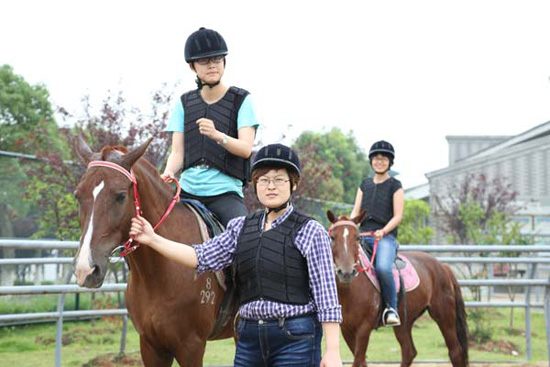
 |
| Li Xiang (left), Shi Jiahui (center) and Ye Runfang participate in a horse-riding training on May 17. Zhang Henghao / for China Daily |
China's first postgrad program for equine management fills need in fledgling industry
With 2013 shaping up to be a tough year for new graduates in the job market, Ye Runfang has good reason to be happy — she has already reached the first rung in her dream career.
"I was born with a natural affection for animals, especially horses," said the latest recruit at the New Zhengda Equestrian Club in Ningbo, Zhejiang province.
Yet she concedes the job would not have been possible without the two years she spent in China's first postgrad program for horse racing and equestrian management.
Launched by Wuhan Business University and Tianjin University of Sport in 2011, the program is aimed at filling the gap between the supply of and demand for trained workers in China's booming equine industry.
With more than 500 equestrian clubs nationwide and at least 15 regular competitions, the industry is already worth roughly 10 billion yuan ($1.6 billion), according to Xia Yunjian, dean of Wuhan Business University's sports and equine school.
He said he sees a bright future for equestrian programs, citing the soaring popularity of horse riding among China's elite.
However, the work to cultivate homegrown talent lags far behind the sector's growth, meaning Chinese equestrian clubs still need to import most of their top managers and specialists.
"The high-end leisure industry, including riding, is developing rapidly and is creating new opportunities," Xia said, adding with optimism, "While the shortage of talent is a major concern, it means there is room to grow, too."
Club executives such as Lin Minglai also have high hopes for such specialist training programs.
"We couldn't be happier," said the general manager of Beijing International Equestrian Club, who works alongside four European executives. "The industry here is in desperate need of competent workers, and we hope more colleges will get involved."
As there was no previous postgrad model to go on, the curriculum at Wuhan Business University was based on a survey of Chinese clubs as well as academic models at universities overseas.
Over two years, Ye and her classmates, Shi Jiahui and Li Xiang, completed theoretical studies in sports management, club operation and English before taking practical courses on riding, grooming, equine disease prevention and stable management.

















 Rainstorms flood more than 10,000 cars in underground garages in Wuhan
Rainstorms flood more than 10,000 cars in underground garages in Wuhan


![]()
